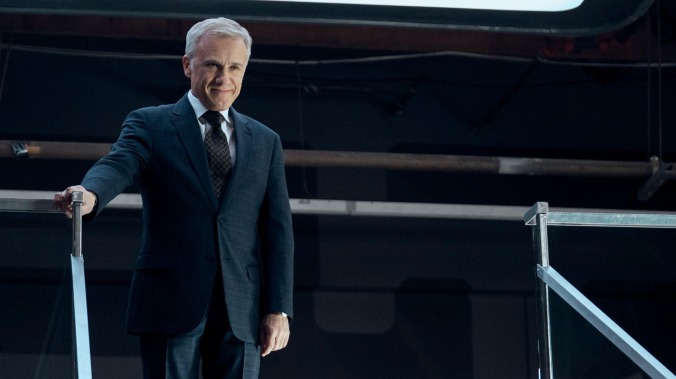The Consultant review: Christoph Waltz can't save Prime Video's workplace thriller
The actor plays a corporate baddie in this mostly stagnant series, which falls well short of its Severance-like aspirations

Photo: Michael Desmond/Prime Video
Adapted from the 2015 novel by Bentley Little and with all episodes scripted by Tony Basgallop (Servant), Prime Video’s latest series, The Consultant, with its strong look and flat characterization, gives us a glimpse into what it might look like if ChatGPT wrote our buzziest shows and movies. If the future of screenwriting is A.I., and the future of A.I. scripting looks anything like this, then the future of television is fine…but not great.
When the CEO of gaming company CompWare is murdered by a kid on a field trip, the company is left in shambles—until Regus Patoff (Christoph Waltz) swoops in to take over. Hired shortly before the murder, Patoff imposes a stringent set of rules and restrictions on the team, turning employees against each other, stoking the fires of paranoia, and cultivating a culture of humiliation and burnout. He focuses his particular strain of sink, swim, or stab mentorship on coder Craig (Nat Wolff) and executive assistant-turned-“creative liaison” Elaine (Brittany O’Grady).
Patoff’s campaign to corrupt Elaine and Craig is the Faustian strand of a show that can feel overstuffed, with plotlines that include beautiful Russian amputees, Craig’s doomed engagement to good Catholic Patti (Aimee Carrero), and a jewelry-store raid in which all the robbers are dressed as characters from Craig’s game. These threads all come together eventually—or rather, they mostly do. But if this is Prime Video’s attempt to capitalize on the success of Apple TV+’s Severance, the final product lacks the concentrated, speculative concept of its precursor. Instead of posing “What if?” The Consultant asks, “What the hell?”
The most compelling presence in the show is the production design; the office is an impressive set-piece comprised of glass, neon, and aggressively vivid screens. The workspace of CompWare is a character, a narrative device, and a motif all rolled into one; characters are hyper-visible through open floorplans and floor-to-ceiling windows, obscured by blinds and locked doors, and hierarchized by the giant staircase that sits dead center. In the back, the shadowy records room, with its filing cabinets and old-timey typewriter, gestures to the human fingerprint (and the human cost) behind the crystalline surfaces of Silicon Valley. The show is best when it keeps the action to this space, and, with Prime Video dropping all eight episodes at once, viewers can binge the series as a four-hour movie and easily imagine it as a kind of filmed stage-play.








































